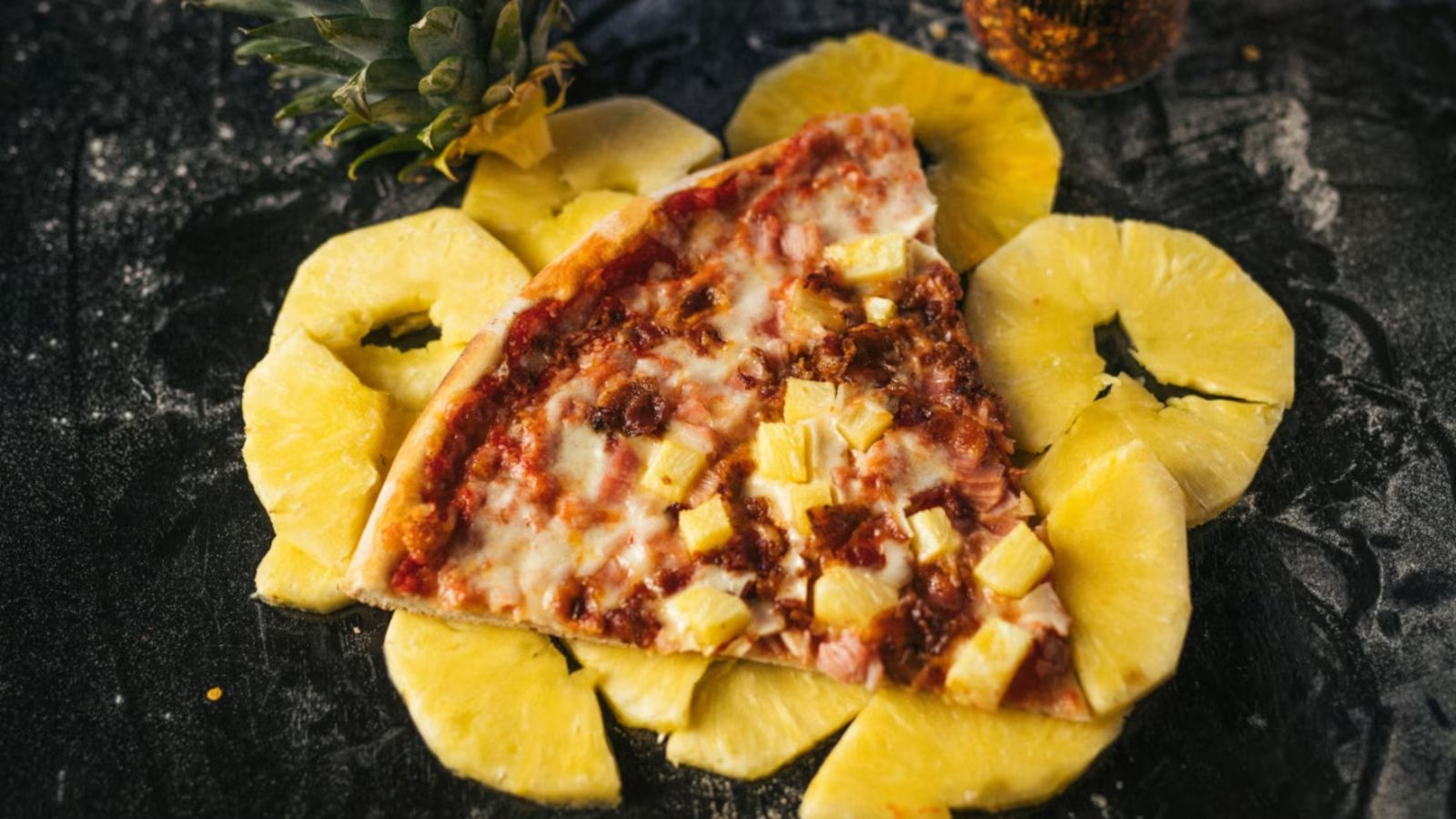A pizzeria in Norwich, England, has taken this polarizing issue to new heights with a bold and humorous move. Lupa Pizza, co-owned by Francis Woolf, has added an extraordinary surcharge of £100 ($122) for customers who dare to request pineapple as a topping.
The culinary world is no stranger to debates about food preferences, but few topics ignite as much passionate debate as the question of pineapple on pizza.
This quirky decision has sparked conversation and controversy, reigniting the age-old argument about whether pineapple belongs on pizza.
A Bold Stance on Pineapple
Lupa Pizza, a cozy establishment in Norwich, typically charges around £12 for its pizzas. However, for pineapple enthusiasts, the price skyrockets to a whopping £100 if they insist on adding the divisive fruit to their order.
The restaurant’s Deliveroo menu reflects this audacious stance, playfully taunting customers with the caption: “Yeah, for £100 you can have it. Order the champagne, too. Go on, you Monster!”
Co-owner Francis Woolf, a staunch opponent of pineapple as a pizza topping, has made no effort to hide his disdain. In an interview with the Norwich Evening News, Woolf candidly expressed his feelings, stating, “I absolutely loathe pineapple on a pizza.” This sentiment has resonated with many who share his viewpoint, while predictably ruffling the feathers of pineapple enthusiasts.
Read : Female Pizza Delivery Worker Stabs Pregnant Woman 14 Times Over $2 Tip in Florida
The bold pricing strategy is as much a statement as it is a practical deterrent. By setting the price so high, Lupa Pizza ensures that only the most die-hard pineapple lovers would be willing to pay the premium.
Read : Top Ten Most Famous Japanese Foods: A Culinary Journey
However, the charge also serves as a humorous commentary on the long-standing culinary debate, drawing attention from both supporters and detractors of the tropical topping.
Public Reaction and Renewed Debate
The £100 pineapple surcharge has sparked lively discussions online and in the media. The controversy caught the attention of public figures, including former UK finance minister Ed Balls, who weighed in by labeling pineapple on pizza as “appalling.” Social media platforms have been flooded with comments, memes, and polls, with users passionately defending or denouncing the topping.
On its Facebook page, Lupa Pizza acknowledged the stir its decision had caused, cheekily writing, “We are looking forward to an influx of pro and anti-pineapple campaigners voting with their feet and wallets! Little scuffle in the street.
All televised.” This playful approach reflects the restaurant’s intention to keep the debate lighthearted while capitalizing on the publicity generated by the controversy.

The pineapple debate is far from new. The argument gained global attention in 2017 when Iceland’s President Guðni Th. Jóhannesson famously declared his dislike for pineapple on pizza, joking that he would ban it if he could.
This declaration reignited a global conversation, with chefs, politicians, and celebrities sharing their opinions on the matter. Lupa Pizza’s move is the latest chapter in this ongoing saga, adding a uniquely British twist to the debate.
The Business of Controversy
From a business perspective, Lupa Pizza’s £100 pineapple surcharge is a clever marketing strategy. The move has drawn widespread media coverage, from local outlets to international publications, placing the Norwich pizzeria in the global spotlight.
By capitalizing on a divisive yet humorous topic, the restaurant has successfully captured the public’s attention and sparked curiosity among potential customers.
While the debate itself may be tongue-in-cheek, the underlying strategy is a testament to the power of branding and differentiation in a competitive market.

By positioning itself as the anti-pineapple pizza purveyor, Lupa Pizza has carved out a niche that appeals to traditionalists while playfully challenging those who dare to defy the norm.
The £100 charge also serves as a symbolic gesture, highlighting the subjective nature of culinary preferences. Whether or not customers actually pay the exorbitant fee, the surcharge reinforces the restaurant’s identity and stance on the pineapple debate. For many, the humor and audacity of the move are reason enough to visit Lupa Pizza and join in the conversation.
Lupa Pizza’s decision to charge £100 for pineapple as a pizza topping is more than just a pricing gimmick; it’s a statement that has reignited a global culinary debate. The bold move has drawn attention from all corners, sparking lively discussions and media coverage that have elevated the Norwich pizzeria’s profile.
Whether you’re a staunch traditionalist or a die-hard pineapple lover, Lupa Pizza’s playful approach reminds us that food debates, while passionate, can also be a source of humor and community. In a world where pizza preferences can divide and unite, one thing is clear: Lupa Pizza has successfully turned an age-old argument into a marketing masterstroke.

